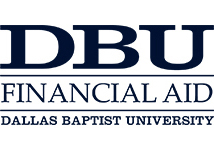Grants
The grants listed below are the State and Federal grants provided to students through the financial aid process at DBU. Grants are a form of gift aid—educational funds that do not need to be earned or repaid. While most grants are provided via the federal and state governments, they may also come from the institution, such as DBU Church Matching Grant Program, or other outside sources. Grants may or may not be need-based but are often very specific in their eligibility and maintenance requirements.
The Federal Pell Grant is a Federal program of entitlement basic to all other student financial aid.
This grant is awarded only to undergraduate students pursuing their first bachelor's degree. The program is based on a need analysis formula, which considers family income and assets, size of family, number of children attending post-secondary schools, and other factors. The formula is applied when an application is made with FAFSA and notification amounts are transmitted to our office electronically with the student's FAFSA file. Application for the grant is automatic when completing the Free Application for Federal Student Aid (FAFSA).
Pell Limitations - Lifetime Eligibility Explained
In 2012 (and effective beginning the 2012-2013 financial aid year) the U.S. Department of Education established new regulations. This change reduces the duration of a student's lifetime eligibility to receive Pell Grant from 18 full-time semesters (or its equivalent) to 12 full-time semesters (or its equivalent). This provision applies to all Federal Pell Grant eligible students.
What does this mean for you?
An eligible student can receive the Federal Pell Grant until the earliest of a bachelor’s degree or until the student has received the Federal Pell Grant for an equivalent of 12 full-time semesters. This limitation includes the percentage of Federal Pell Grant the student has received from all post-secondary institutions regardless of when the student began receiving aid. Since receipt of a full Federal Pell Grant annual award is equivalent to 100% (based on two (50%) full-time semesters per award year), 12 full-time semesters equates to 600%.
Tracking your Lifetime Eligibility Used on NSLDS
You can find your Lifetime Eligibility Used for the Federal Pell Grant by using your FSDA ID to access the National Student Loan Data System (NSLDS). NSLDS is the U.S. Department of Education's (ED's) central database for student aid. NSLDS receives data from schools, guaranty agencies, the Direct Loan program, and other Department of ED programs. NSLDS Student Access provides a centralized, integrated view of Title IV loans and grants so that recipients of Title IV Aid can access and inquire about their Title IV loans and/or grant data.
The Federal Supplemental Educational Opportunity Grant (FSEOG or SEOG) is an additional grant available to undergraduate students with exceptional financial need and gives priority to students who receive Federal Pell Grants and whose Student Aid Index (SAI) is a negative -1500 to a zero. As it is a grant, the FSEOG does not need to be repaid.
Eligibility is determined through the information provided on the Free Application of Federal Student Aid (FAFSA). Completing a FAFSA as early as possible will provide students the opportunity at the most federal aid – including being considered for this grant. The FAFSA may be completed beginning October 1 each year, for the upcoming Fall, Spring, and Summer semesters.
Every school that participates in the FSEOG program receives a specific amount of funding, and not all schools have the same amount of FSEOG funds as a resource to assist students.
Additional requisites for eligibility include:
- Meet all Department of Education eligibility requirements
- Be enrolled or accepted for enrollment and working towards a degree or certification in an eligible program
- Be an undergraduate student who has not earned a bachelor's degree
- Continuing students must meet the standards of the Financial Aid Satisfactory Academic Progress Policy (SAP)
- Be registered in and attending at least 6 hours a semester
- Have financial need as determined by the FAFSA
- Have a high school diploma or GED certificate
- Complete the Free Application for Federal Student Aid (FAFSA) form
The Tuition Equalization Grant (TEG) is a State of Texas grant program for residents attending a private university in the State of Texas.
The TEG is provided to both undergraduate and masters level students (with some restrictions) and is meant to help offset some of the difference in cost for students attending private universities in Texas.
The total Texas Equalization Grant (TEG) funding allocated to Dallas Baptist University is determined annually by the Texas Higher Education Coordinating Board (THECB) and is subject to change each year. Consequently, priority consideration is given to undergraduate students demonstrating financial need at the beginning of the academic year. Should additional funds become available at a later time, limited awards may be extended to eligible graduate or professional students. The Financial Aid Office will notify those students if and when such funds are available.
To be awarded the Tuition Equalization Grant (TEG), a student must:
- Meet all requirements to receive Federal aid as described previously;
- Be a legal Texas resident. If a dependent student, parents must be legal Texas residents;
- Be enrolled three-quarters time in a semester to receive the grant for that semester (except for the final semester when graduating);
- Be pursuing a first bachelor's degree, first master's degree, or first doctoral degree;
- Not be the recipient of an athletic scholarship;
- Not be pursuing a degree program leading to a career in ministry; (Contact the Office of Financial Aid with questions about specific program limitations.)
- Other limitations may apply. Contact the Office of Financial Aid for more information.
As an undergraduate student, you must complete 24 hours in a year (Fall, Spring, Summer). As a graduate student, you must complete 18 hours in a year (Fall, Spring, Summer).
Additionally, a student must meet all the Satisfactory Academic Policy guidelines set forth in our Tuition Equalization Grant (TEG) Satisfactory Academic Progress Policy.

